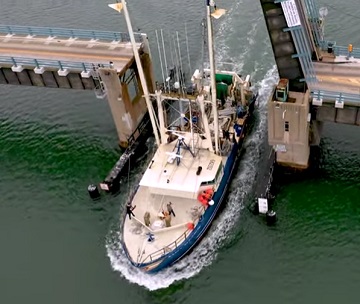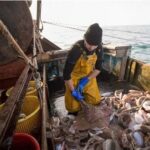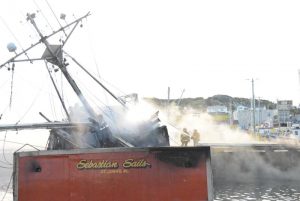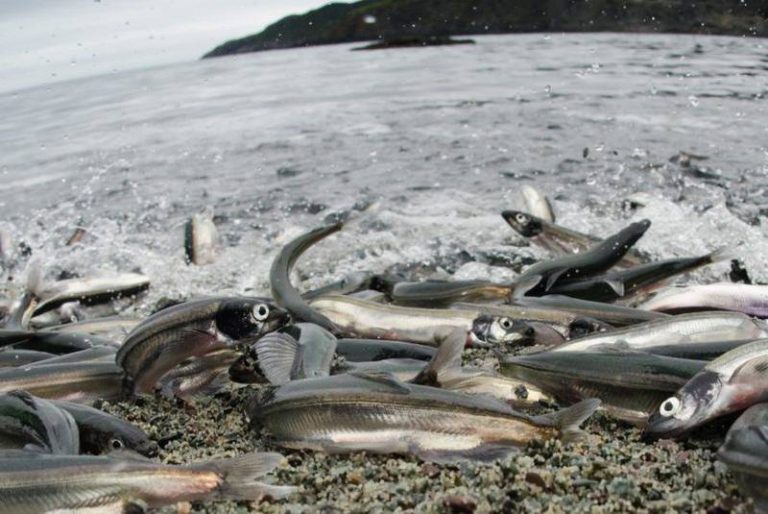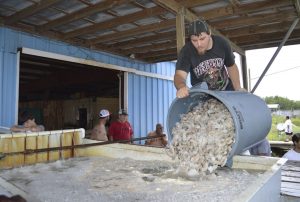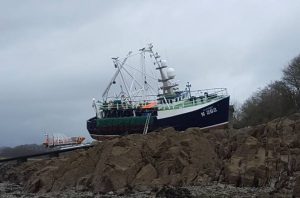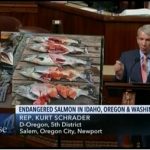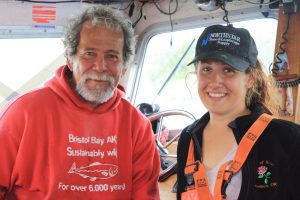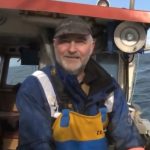Tag Archives: Herring fishermen
A true story, but ever so fishy…
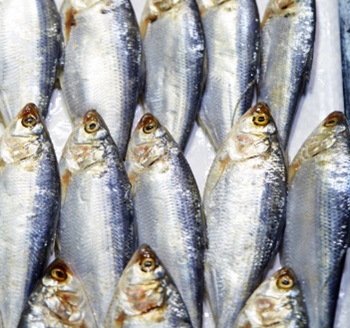 You may have heard of Chevron, the huge oil and gas company and probably one of the biggest oil producers in the world. But you may not have heard of the “Chevron deference” justified by congressional agencies. This became an unspoken government policy some 40 years ago. Here is the unspoken protocol. Congress would legislate a new, ambiguous bill to “fix” an issue. The enacted law was then passed to one of the agencies such as the FDA, EPA, USDA, or if there wasn’t a specific agency, a new one was formed. The purpose was to formulate government policy using the new law. An example is when President Jimmy Carter formed the Department of Energy in 1977. Reportedly it was to plan strategies to conserve energy and develop alternative energy sources. I will let readers form their own opinions in this time of shifting energy strategies. Yet 40 some years later, it almost all falls back on using fossil fuels. Let’s face it. Windmills and solar panels aren’t the long-term solution. more, >>CLICK TO EAD<< 07:03
You may have heard of Chevron, the huge oil and gas company and probably one of the biggest oil producers in the world. But you may not have heard of the “Chevron deference” justified by congressional agencies. This became an unspoken government policy some 40 years ago. Here is the unspoken protocol. Congress would legislate a new, ambiguous bill to “fix” an issue. The enacted law was then passed to one of the agencies such as the FDA, EPA, USDA, or if there wasn’t a specific agency, a new one was formed. The purpose was to formulate government policy using the new law. An example is when President Jimmy Carter formed the Department of Energy in 1977. Reportedly it was to plan strategies to conserve energy and develop alternative energy sources. I will let readers form their own opinions in this time of shifting energy strategies. Yet 40 some years later, it almost all falls back on using fossil fuels. Let’s face it. Windmills and solar panels aren’t the long-term solution. more, >>CLICK TO EAD<< 07:03
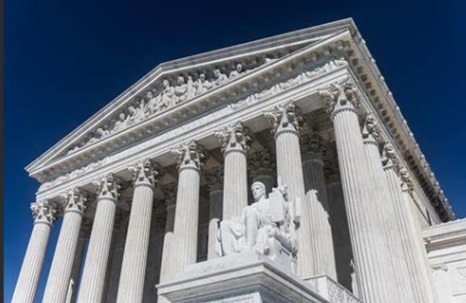
Supreme Court Strips Power from Federal Agencies—Overturning Decades-Old Precedent
The Supreme Court overturned a landmark ruling Friday that gave widespread power to federal agencies, a seismic ruling that has the power to upend how the federal government operates—and delivers a win to conservative groups who long wanted to see the precedent overturned. “Loper Bright Enterprises v. Raimondo” and “Relentless v. Chamber of Commerce” are two linked disputes, both brought by herring fishermen who opposed a federal policy requiring them to pay $700 per day to carry federal monitors on their vessels. The cases more broadly asked the court to overturn “Chevron v. Natural Resources Defense Council,” a landmark 1984 ruling that gave federal agencies broad power to enact regulations by arguing courts should usually defer to agency staff—a precedent that high-profile figures on the right have long wanted to see struck down. more, >>CLICK TO READ<< 10:29
How a Supreme Court case involving herring fishermen affects the Little Sisters of the Poor
 A Supreme Court case being argued this week could have significant implications for a decade-long religious liberty battle fought by the Little Sisters of the Poor. The Supreme Court will hear oral arguments this week in Loper Bright Enterprises, Inc. v. Gina Raimondo, a case challenging the authority of the federal administrative state to dictate certain rules and regulations related to federal laws. Okay, so how are the Little Sisters involved? Though the involvement of a group of Catholic religious would seem unlikely in a case such as this, the Little Sisters of the Poor are participants in the Loper case, with the nuns having filed a friend of the court brief last year in support of the fishermen. more, >>click to read<< 12:46
A Supreme Court case being argued this week could have significant implications for a decade-long religious liberty battle fought by the Little Sisters of the Poor. The Supreme Court will hear oral arguments this week in Loper Bright Enterprises, Inc. v. Gina Raimondo, a case challenging the authority of the federal administrative state to dictate certain rules and regulations related to federal laws. Okay, so how are the Little Sisters involved? Though the involvement of a group of Catholic religious would seem unlikely in a case such as this, the Little Sisters of the Poor are participants in the Loper case, with the nuns having filed a friend of the court brief last year in support of the fishermen. more, >>click to read<< 12:46
A group of herring fishermen may put a hook in the Biden Administration’s power
 Even far out on the open water, where Bill Bright navigates his 140-foot fishing trawler in search of the Atlantic herring that school below the surface, the federal government always feels startlingly within reach. Bright and other captains alert regulators before they push off. A reporting system pings the boat’s location throughout the day. And sometimes Bright must bring a government mandated federal observer on board whose job is to collect data about the catch and ensure the rules are followed. Bright doesn’t mind those regulations. But he and his fellow fishermen are adamantly opposed to a 2020 federal rule that requires them to pay the salary of the observers they bring aboard – adding $700 a day to their costs. ”But this is not politics to me. This is about what’s right. This is about what’s right for our fishery.” photos, more, >>click to read<< 11:01
Even far out on the open water, where Bill Bright navigates his 140-foot fishing trawler in search of the Atlantic herring that school below the surface, the federal government always feels startlingly within reach. Bright and other captains alert regulators before they push off. A reporting system pings the boat’s location throughout the day. And sometimes Bright must bring a government mandated federal observer on board whose job is to collect data about the catch and ensure the rules are followed. Bright doesn’t mind those regulations. But he and his fellow fishermen are adamantly opposed to a 2020 federal rule that requires them to pay the salary of the observers they bring aboard – adding $700 a day to their costs. ”But this is not politics to me. This is about what’s right. This is about what’s right for our fishery.” photos, more, >>click to read<< 11:01
A group of commercial fishermen have ended up before the Supreme Court
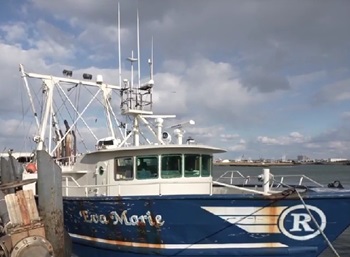 An unforgiving southeast wind cut across Cape May, New Jersey, on a recent Tuesday morning; the 50-mile-per-hour gusts were so strong they created white caps on a section of the bay here that is typically calm. There would be no fishing for Bill Bright and his crew. “We don’t have crop insurance. If the fish don’t show up, there’s no bailout,” the 64-year-old said, standing on the deck of the Eva Marie, an 88-foot-long fishing vessel used to catch herring. As a lifelong fisherman, Bright is used to slow days. But a recent shift in tidal fortunes here has nothing to do with fish and everything to do with the federal government. “What’s at stake for us is our future,” Bright said. For years, fishermen like Bill Bright and his colleague Wayne Reichle have been required to take federal observers on their boats when they set out into the North Atlantic in search of herring. Video , >>click to read<< 19:06
An unforgiving southeast wind cut across Cape May, New Jersey, on a recent Tuesday morning; the 50-mile-per-hour gusts were so strong they created white caps on a section of the bay here that is typically calm. There would be no fishing for Bill Bright and his crew. “We don’t have crop insurance. If the fish don’t show up, there’s no bailout,” the 64-year-old said, standing on the deck of the Eva Marie, an 88-foot-long fishing vessel used to catch herring. As a lifelong fisherman, Bright is used to slow days. But a recent shift in tidal fortunes here has nothing to do with fish and everything to do with the federal government. “What’s at stake for us is our future,” Bright said. For years, fishermen like Bill Bright and his colleague Wayne Reichle have been required to take federal observers on their boats when they set out into the North Atlantic in search of herring. Video , >>click to read<< 19:06
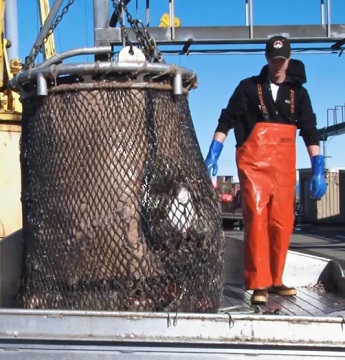
‘It’s Just Not a Fair Fight’: Supreme Court to Hear Case that Could End Bureaucratic Rule
“There’s going to be plenty of trips where that monitor will make more than myself or my crew,” said Stefan Axelsson, a commercial fisherman. He and other herring fishermen from Cape May, New Jersey sued over the rule and their case will be heard by the Supreme Court next term, where it will be argued by famed appellate lawyer Paul Clement. “When you have the federal government regulating small businesses it’s just not a fair fight,” Clement recently told The Hugh Hewitt Show. However, instead of just hearing the specifics of this case alone, justices have chosen to take on the bigger issue by reviewing the power of the entire federal bureaucracy. Specifically considering one of the most important, and powerful, principles in the world of bureaucratic rulemaking known as the “Chevron doctrine.” >click to read< 14:02
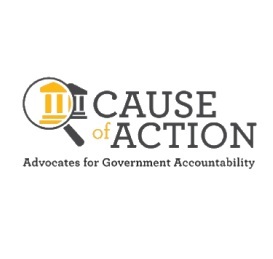
Fishermen File Supreme Court Opening Brief Challenging Chevron Deference
July 17, 2023. A group of New Jersey herring fishermen today filed opening arguments asking the Supreme Court to strike down an unlawful federal regulation that could force them to surrender 20 percent of their earnings to pay for at-sea monitors. The regulation, argue the fishermen, is not supported by law. Former U.S. Solicitor General Paul Clement and lawyers from Cause of Action Institute represent the fishermen. They hope the justices will use the case to overrule Chevron deference, a legal doctrine that requires federal courts to defer to agency interpretations of law, even in the absence of expressed congressional authorization. >click to read the press release< 16:04

Fate of NJ Fishermen in the Hands of Supreme Court
New Jersey herring fishermen asked the Supreme Court in a final brief to rein in regulators that rely on judicial deference to circumvent the will of Congress. The fishermen are challenging the lawfulness of a regulation that could force them to hand over 20 percent of their pay to third-party at-sea monitors they must carry on their boats—a mandate that Congress never approved by statute and did not give the National Marine Fisheries Service (NMFS) the authority to require by regulation. The U.S. Solicitor General recently filed a brief with the Court urging the justices to ignore the checks and balances of the U.S. Constitution in order to preserve the controversial doctrine of Chevrondeference. >click to read the press release< 15:22
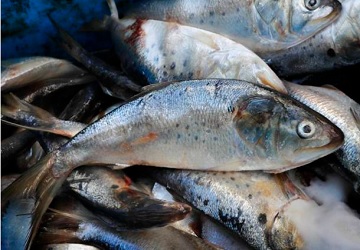
Surge in baitfish catch is a boon to Maine’s lobstermen
Maine’s lobster fishermen typically bait their traps with dead herring, but a scientific assessment in 2020 found that herring are overfished, and quotas for the fish were reduced dramatically. The loss of herring has increased the price of bait and made it harder for many fishermen to trap lobsters. However, losing herring has been offset somewhat by swelling catches of menhaden. Maine’s catch of menhaden, also called pogies or bunker, grew from about 6 million pounds in 2016 to more than 24 million pounds last year. >click to read< 11:28
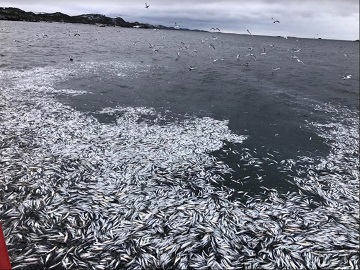
Hundreds of thousands of pounds of herring dumped last week due to backward DFO policy
Seaward Enterprises Association of Newfoundland and Labrador condemns the Department of Fisheries and Oceans policy that allowed for the dumping of hundreds of thousands of pounds of herring last week alone. “Any DFO policy that allows for the dumping of fish is a backward policy that must end immediately,” says Ryan Cleary, SEA-NL’s interim Executive Director. “Fishermen should be permitted to land the herring they catch, with the total amount subtracted from the overall quota.” Herring fishermen here in the province say hundreds of thousands of pounds were dumped last week alone as the result of federal policy that sets the small-fish tolerance at 20%. >click to read< 12:35

Herring Fishermen lose challenge to rule requiring at-sea monitors
A federal judge in Washington D.C. on Tuesday denied the bid of New Jersey-based herring fishermen who sued the National Marine Fisheries Service (NMFS) last year to block a new regulation that will require them to pay for third-party “at-sea monitors” who will survey by-catch. U.S. District Judge Emmet Sullivan ruled that the agency had not acted in violation of the MSA,,, About half-a-dozen small fishing vessel operators, including the Loper Bright Enterprise, brought the lawsuit last year. >click to read< 11:57

Herring Fishermen Sue Chevron Over California Oil Leak
A pipeline rupture that gushed hundreds of gallons of oil into the San Francisco Bay spurred a class action filed Tuesday that accuses a Chevron refinery of prioritizing profits over safety and threatening the survival of herring in the area for years to come. “We have been working for years to preserve and protect the herring that spawn in the Bay,” said plaintiff John Mellor, a longtime fisherman and vice president of the San Francisco Herring Association. On Feb. 9, a Chevron refinery in the East Bay city of Richmond, California, discovered a pipeline leak,,, >click to read< 10:45
Herring fishermen lose on higher haddock bycatch limit
Herring fishermen are struggling to avoid haddock because the stock on Georges Bank is increasing, said Tooley, who also is a council member but recused herself from Thursday’s vote. At the same time, federal regulators have lowered the cap for haddock bycatch from previous years, she said. “The biomass has gone up and the cap has gone down. That’s the problem,” she said. Read more here 11:12
British Columbia Herring fishermen ask feds for $6 million to compensate losses
![]() Three areas were set to reopen to commercial fishing this year: Haida Gwaii, the central coast, and the west coast of Vancouver Island. Fishermen say their losses include license fees and potential catches of upwards 2,000 tonnes of herring on the West Coast of Vancouver Island,,, thetyee Read more here 21:23
Three areas were set to reopen to commercial fishing this year: Haida Gwaii, the central coast, and the west coast of Vancouver Island. Fishermen say their losses include license fees and potential catches of upwards 2,000 tonnes of herring on the West Coast of Vancouver Island,,, thetyee Read more here 21:23






